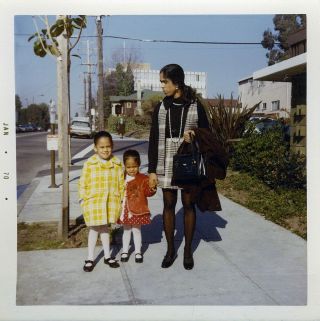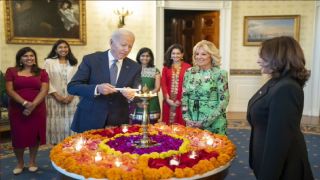Identity
The Psychology of Multicultural Identity
Analyzing identity through the lives of Kamala Harris and Nikki Haley.
Updated January 23, 2024 Reviewed by Abigail Fagan
Walt Whitman wrote "I am large. I contain multitudes," anticipating a multicultural America at its founding. Two of our politicians speak to the psychology of their multicultural identity in contemporary times. That they have embraced opposing views of American exceptionalism makes the story predictable yet interesting.
As the race for the 2024 U.S. presidential election heats up, Governor Nimarata "Nikki" Randhawa Haley has emerged as one of the leading GOP candidates. Recently, when she was asked about the causes of the Civil War, she fumbled the ball, forgetting to mention the cause of slavery, and later apologizing for it.

We already have a Black-South Asian female Vice President, Kamala Devi Harris, whose mother, Shyamala Gopalan, came from Chennai to the U.S. to study endocrinology at UC Berkeley in 1958, a decade after India’s independence. Shyamala married a Berkeley-educated, Stanford economist, Donald J. Harris, whose family was from Jamaica, a post-colonial outpost that gained independence in 1962, the birthplace of Reggae music and Island Records.
Shyamala's ancestors fought for India’s freedom, while Donald Harris’ family may have had descendants who had owned slaves on the sugar plantations in Jamaica. On a recent visit to Antigua and Barbuda, I was reminded of the history of British colonialism and trade between the colonies that fueled the rise of early capitalism, while Bob Marley’s “Buffalo Soldier” filled the air. “Buffalo Solder... Stolen from Africa, brought to America. Fighting on arrival, fighting for survival.”
VP Harris has said she used to visit both sides of her family—in Chennai, India, and Brown’s Town, Jamaica—and understands how her own story is intertwined with the history of slavery and post-colonialism. She identifies herself as Black, South Asian, and quintessentially American.

VP Harris embraces what psychologists have called a multicultural identity, where various aspects of her identification are given relatively equal weight, leading to integration and well-being.
Governor Nikki Haley, on the other hand, belongs to a family of warriors, continuing the Sikh tradition of her people; her husband, Michael Haley, and brother, Mitti Randhawa, have served in combat in Iraq and Afghanistan. She was the first female governor of South Carolina; she also took down the Confederate flag after the shooting of Black parishioners at Emanuel African Methodist Church in 2015 by a White nationalist.
She served as the UN secretary under Trump, who is now spreading a “birther controversy” about her name not being American enough. Yet she has steadfastly claimed that the U.S. is not a racist country. She once checked on her voter registration card that she was “White” when the census classifications were not clear about the “Asian” category on the census form. She has tried to balance the nativist vision of American exceptionalism prevalent in her party with her Indian heritage.
Governor Nikki Haley exemplifies what psychologists have identified as an assimilationist view of identity, where the majoritarian White identity dominates the life narrative, while other minority identifications are subsumed underneath.
_1.jpg?itok=NJezWPlk)
How is it that Governor Nikki Haley, who was the governor of a state where the Civil War started, could forget about the root causes of America’s bloody history?
I have a sneaking suspicion as to why she didn't mention slavery. The party of Lincoln may now want to reassess the history of the Civil War under their new leadership.
However, there is a silver lining in all this. Only in America can we witness two first-generation immigrant female candidates, vying for the top job, who are, to quote Thomas Paine, trying "to start the world over again."
References
Batkhina, A., Berry, J. W., Jurcik, T., Dubrov, D. and Grigoryev, D. (2023). More Similarity if Different, More Difference if Similar: Assimilation, Colorblindness, Multiculturalism, Polyculturalism, and Generalized and Specific Negative Intergroup Bias, Eur J Psychol. 2022 Nov; 18(4): 369–390.
Glazer, N. and Moynihan, D. P. (1970). Beyond the Melting Pot, 2nd Edition. MIT Press.
Nichols, J. (2023). The Revolutionary Fight to “Begin the World Over Again” Did Not End in 1776, last accessed on Jan 22, https://www.thenation.com/article/politics/memorial-day-history-thomas-…
Whitman, Walt. (1892). Song of myself. S4N Books.


